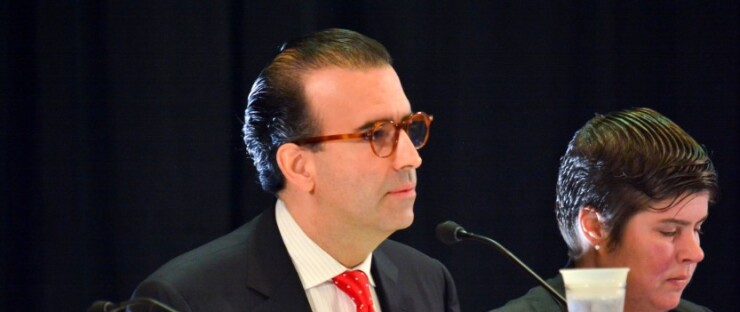Puerto Rico Oversight Board Chairman José Carrión and Board Member Carlos García gave notice of their resignations on Wednesday.
The Puerto Rico Oversight, Management, and Economic Stability Act specified they would have three-year terms. President Barack Obama named the members to the board in August 2016.

García had provided expertise on debt issues to the board. Carrión had a broad knowledge of policy issues and a personal background as a successful Puerto Rican businessman.
Carrión said he would work until Oct. 5 or when he was replaced. García said his last day on the board would be Aug. 31.
Carrión said his proudest accomplishment was guaranteeing pension payments to public employees despite the system’s insolvency. He also mentioned approving fiscal plans and budgets with appropriate controls and discipline, the restructuring of Puerto Rico’s debt, and the takeover of the electric power system’s transmission and distribution system by a private entity.
Carrión said, “Of course there have been disappointments along the way as well, chief amongst them the lack of commitment and political will of various government administrations to implement structural reforms," Carrión said. "It is well known and understood that these reforms are necessary to propel our economy beyond its dependency on federal transfers.
“Puerto Rico does not lack human capital, ideas, plans or studies to improve its economy,” Carrión said. “What it lacks is determination from its leaders to implement transformative reforms for the benefit of the people.”
Carrión said that in 2016 he “received a call that would lead me to the most challenging, toughest and demanding job I have ever had in my professional career. Nonetheless and without regrets, I must say that serving as chair of the Oversight Board has also been the most rewarding.”
At Wednesday’s meeting, Board Member David Skeel said both Carrión and García had “irreplaceable gifts” and that both had put in enormous amounts of time. Carrión, García and all the board members have been serving without financial compensation.
PROMESA allows board members to continue in their roles if Congress doesn’t appoint replacements. Congressional leaders have been waiting for the U.S. Supreme Court to rule on a case brought by hedge fund Aurelius before nominating potential board members. On June 1 the court upheld the appointments and means of appointments of the seven board members.
The departure of the two members will open up a struggle within Congress and the administration to find replacements who follow the ideological outlook of those making the appointments.
U.S. Senate majority and minority leaders and U.S. House Speaker and minority leaders nominate board members and the president gives final approval. The same procedure is to be used for replacements as was used for the appointing.
According to the El Nuevo Dia news website, then Speaker Paul Ryan nominated Carrión. Under PROMESA that would mean current Speaker Nancy Pelosi would nominate his replacement. Of course, the fact Ryan and Pelosi are in different parties is significant.
Carrión was the only board member who resided in Puerto Rico. It is unknown which party’s leader appointed García. As per PROMESA, at least one of the replacement members would have to reside in Puerto Rico.
In other developments at Wednesday’s meeting the board approved fiscal 2021 budgets for the central government, eight Puerto Rico instrumentalities and agencies, and 10 municipalities.
The board said it increased the commonwealth’s All Funds budget 10% to $22.2 billion, mainly due to a projected 17% increase in federal funds. The board expects these funds to increase to $8.9 billion from $7.6 billion.
The increase in the All Funds budget is also due to a 5% increase in the General Fund budget, to $10.045 billion. This increase is partly due to certain increases in healthcare and a one-year delay in long-planned cuts to government spending.
At Wednesday’s meeting some board members also expressed their displeasure with the slowness of the release of the commonwealth’s comprehensive annual financial statements. While the commonwealth entered fiscal 2021 Wednesday, it hasn’t yet released these statements for fiscal years going back to 2017.
Puerto Rico Treasury Secretary Francisco Parés Alicea said as of right now he expected to release a draft of the fiscal 2019 CAFR by Jan. 31, 2022, with the earlier CAFR expected before then.
Board Member García said the timetable was “completely unacceptable.” He said Puerto Rico would never be able to borrow without up-to-date financial statements.
Parés Alicea said over several years the section within his department that was assigned to create the statements had been reduced to 27 employees from 208 employees. He said these employees are paid much less than they can earn in the private sector.
García called for the Treasury Secretary to come back to the board for a hearing on steps he wants taken so that all the statements could be completed within 12 months. The board members agreed to schedule such a hearing in 30 days.
Parés Alicea said many Puerto Rico government agencies are working shorthanded due to the board’s spending restrictions. He said these were causing the agencies to be inefficient.
Correction: The Oversight Board meeting and the resignation announcements were on Wednesday. Earlier versions of the story and photo caption incorrectly stated the day of the week. The board also approved budgets for fiscal year 2021. The year was unclear in the original version of the story because of a typo.





